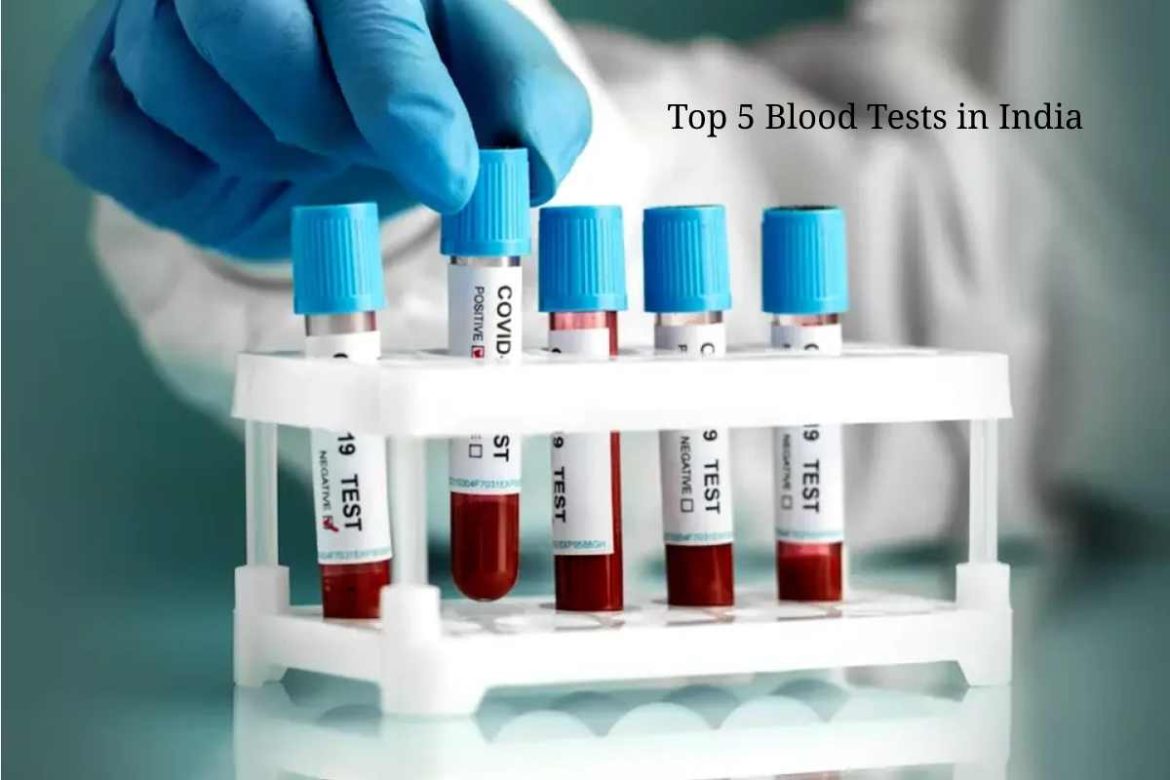Top 5 Blood Tests in India – Without a thorough understanding of what is happening inside your body, it is impossible to create a personalised wellness programme for reaching optimal health. The good news is that a combination of blood tests may easily identify your unique requirements, deficits, and imbalances. Knowing which blood test alternatives are most crucial is the key.
Blood tests are reliable. Even before people perceive these changes, they can show signs of sickness, age, or degeneration. These blood testing choices are safe to use and give people the power to take control of their health and wellness because skilled, reliable healthcare professionals perform them.
A vital way to monitor your general health is through routine blood testing. Regular testing can enable you to see the changes your body experiences as you age and provide you with the information you need to make wise health decisions.
A vital picture of your general health and well-being can be obtained from blood testing. These studies help in the early detection of a disease, which prevents it from developing into a more serious stage. They can also assist you in keeping track of how your body reacts to various disease treatments.
How Frequently Should You Be Tested?
Typically, your doctor will advise having routine blood work performed at least once every year. Additional factors that can motivate you to get a blood test are as follows;
- If you want to alter your way of life. You may want to change your diet or exercise regimen if there are abnormalities in certain parameters like low-density lipoprotein (LDL) and high-density lipoprotein (HDL).
- If you have uncharacteristic, ongoing symptoms including exhaustion, odd weight gain or loss, or new discomfort.
- If your family history or lifestyle choices put you at higher risk of developing a particular ailment.
Regular blood tests can detect the early warning signs of most diseases, helping you determine or lower your risk of developing diseases or consequences.
The top 5 regular blood tests that are crucial for maintaining good health and avoiding sneaky health risks are listed below:
1.Complete Blood Count (Hemogram)
The following components of each major blood cell are measured as part of a routine CBC test:
- White blood cells (WBCs)
- Red blood cells (RBCs)
- Platelets
- Hematocrit
- Hemoglobin (protein in RBCs)
- Mean corpuscular volume
- And other blood parameters
These lab tests’ aberrant results may reveal:
- insufficient blood cells
- nutritional deficits, such as those in the vitamins B6 and B12
- tissue swelling
- deficit in iron
- indications of infection
- heart problems.
2.Liver Panel
A liver panel or liver function test examines a variety of factors, including the proteins, enzymes, and other substances the liver produces. A liver function test or LFT test can provide critical values such as:
- Alkaline phosphatase (ALP)
- Albumin
- Aspartate aminotransferase (AST)
- Alanine aminotransferase (ALT)
Increased levels of these substances can be a sign of liver conditions such as cirrhosis, fatty liver, and hepatitis, whereas decreased ALP levels may be a sign of bone metabolic abnormalities.
3. Lipid Panel
This test finds out how much various kinds of cholesterol and associated lipids are present in the blood. Normally, it contains;
- HDL, or “good” cholesterol
- “Bad” cholesterol, or LDL,
- Triglycerides
- Total Cholesterol
The purpose of this panel is to evaluate the risk of cardiac problems, particularly in elderly people. Your lifestyle decisions may be influenced and improved by findings of this exam.
4. Coagulation Panel
International normalised ratios (INR), and Prothrombin time (PT) tests which examine your body’s capacity to clot blood and the time required for blood to clot, are examples of coagulation tests.
Clotting is an essential bodily activity. These blood tests can stop you from bleeding out in the event of an injury, surgery, etc.
Additionally, the results of these tests can identify any underlying problems linked to poor clotting, including:
- Acute Myeloid leukaemia
- Hemophilia
- Conditional liver thrombosis
- a lack of vitamin K.
5. Test for Essential Nutrients
Blood tests measuring the body’s levels of specific minerals, such as iron, vitamin B12, vitamin D, and magnesium, which are essential for normal bodily processes, are significant.
It is crucial to assess these levels and supplement them as necessary because the majority of people are lacking in these nutrients for a variety of reasons. These nutrients can help prevent a number of diseases, including iron deficiency anaemia, chronic or acute pain, fracture, risk of falls etc.
A common phrase used to describe diagnostic examinations is “prevention is better than cure”. Certain diseases can be prevented from progressing into more severe forms by early diagnosis. These lab tests, however, are frequently insufficient to provide a definitive diagnosis. A large number of blood tests are first utilized to find any abnormalities, and then, with the aid of a healthcare professional, these results are further compare with other investigations to arrive at a definitive diagnosis.
In order to ensure that the test findings are as precise as possible, most blood tests call for fasting for 8 to 12 hours. This can ensure that any factors, such as proteins, vitamins, and other nutrients, are removed from the test results.
As a result, routine blood testing should be performed at least once a year. To ensure your health is at its best, always follow your doctor’s instructions when it comes to taking additional blood tests.


